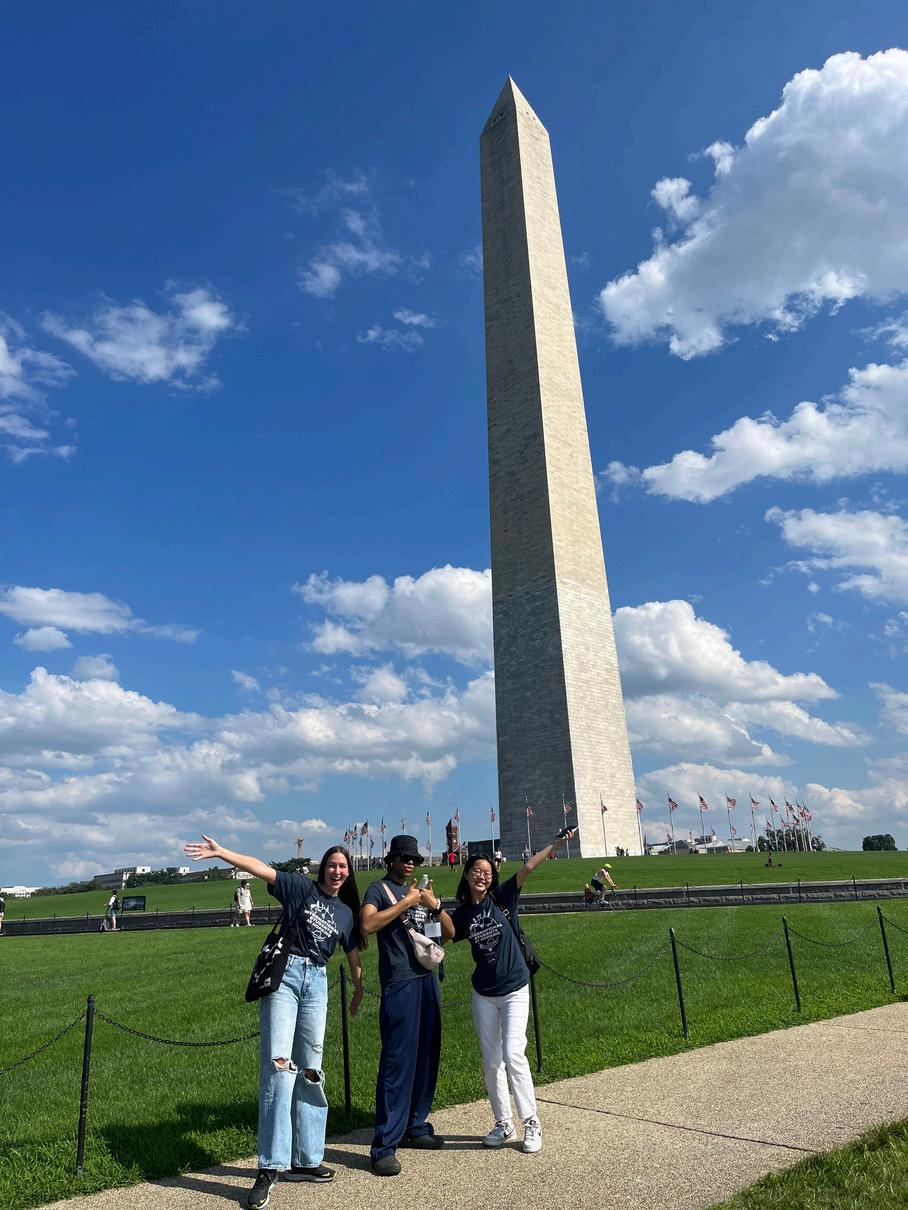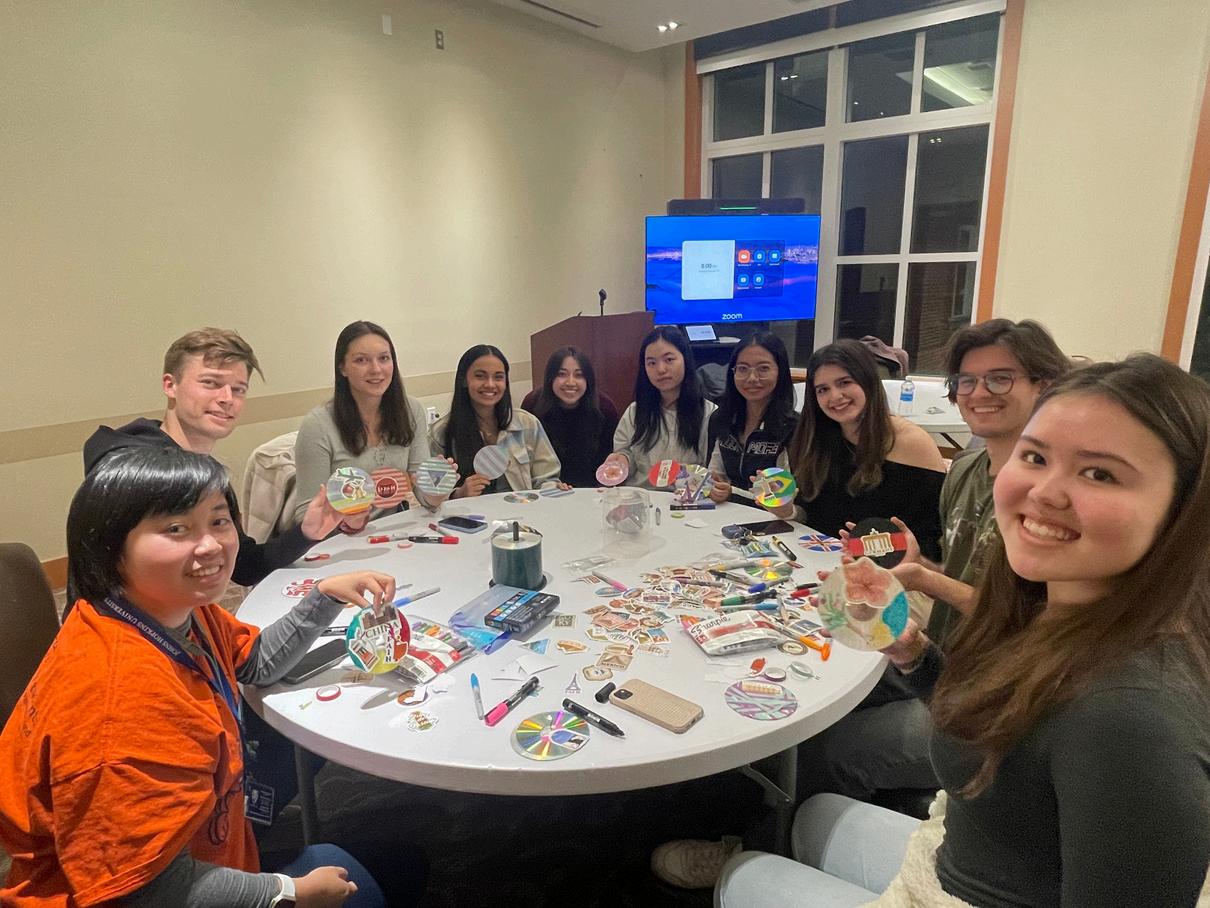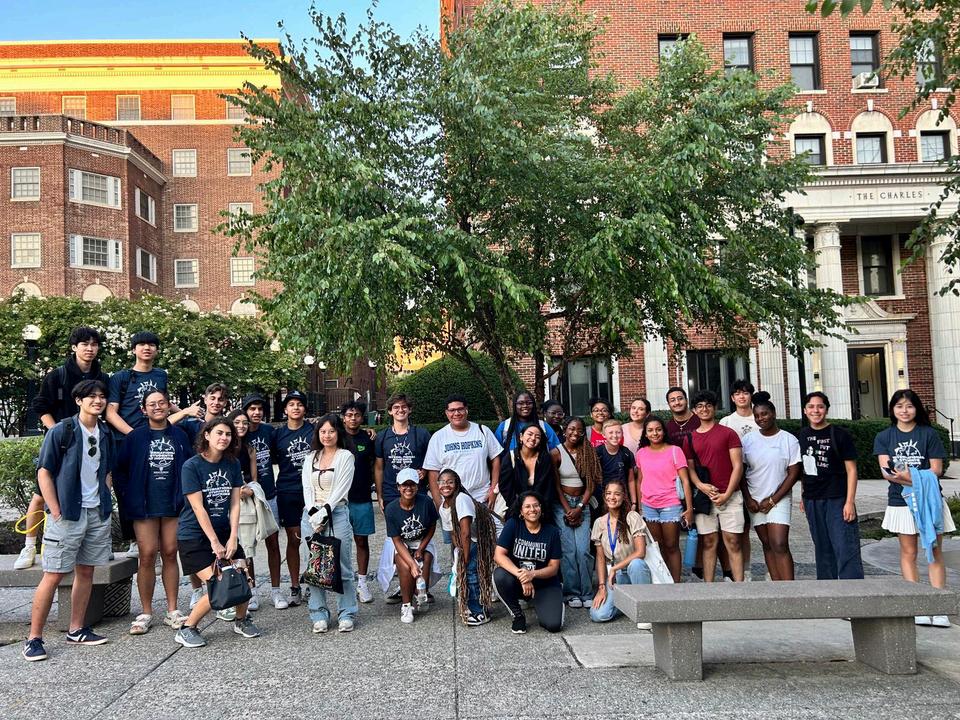2024-2025
STUDENT GUIDEBOOK FOR



A comprehensive introduction to Johns Hopkins University, local resources, university departments, transportation, and more!



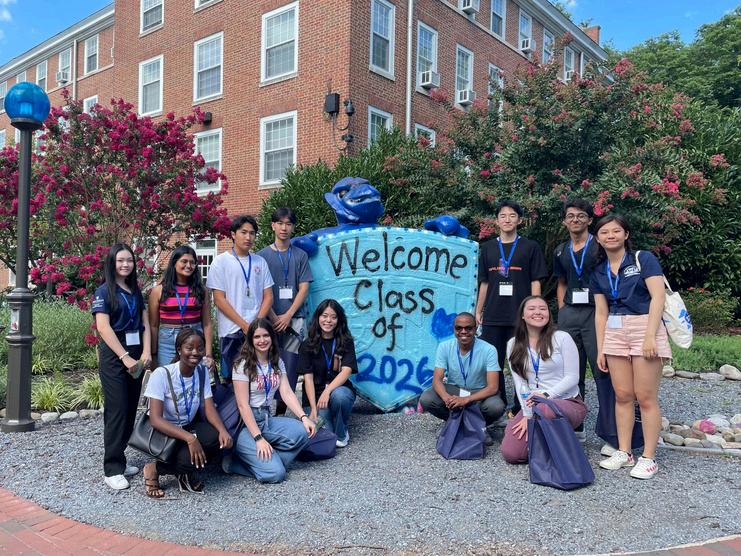
Welcome p. 2 ISAH Overview p. 3

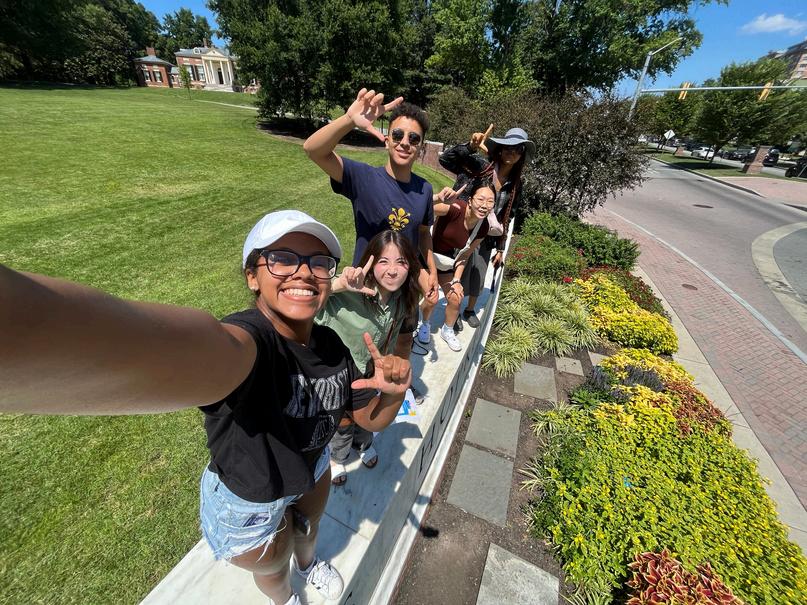
C O N T E N T S T A
B L E O F
Student Employment p.6 Life in Baltimore p.7

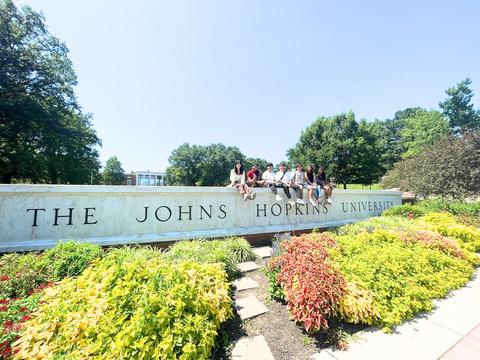
Campus Life p.16
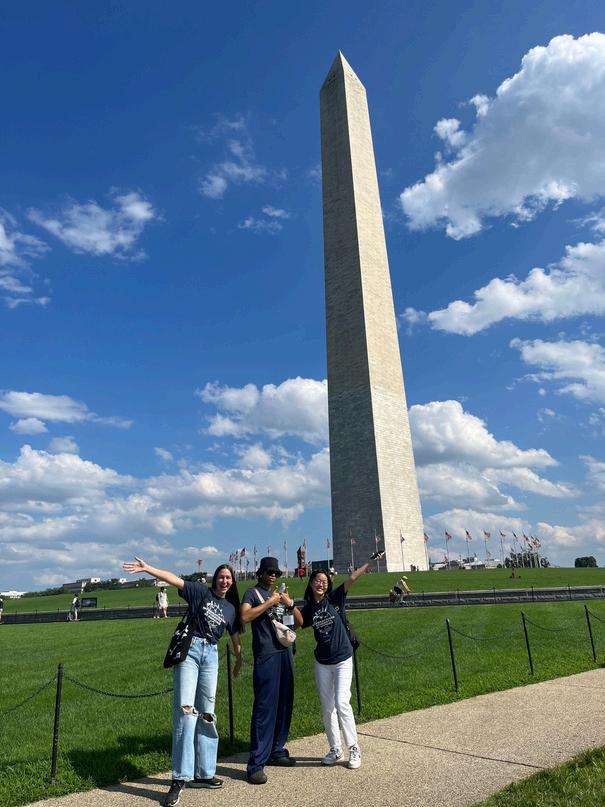
U.S. Culture p.29
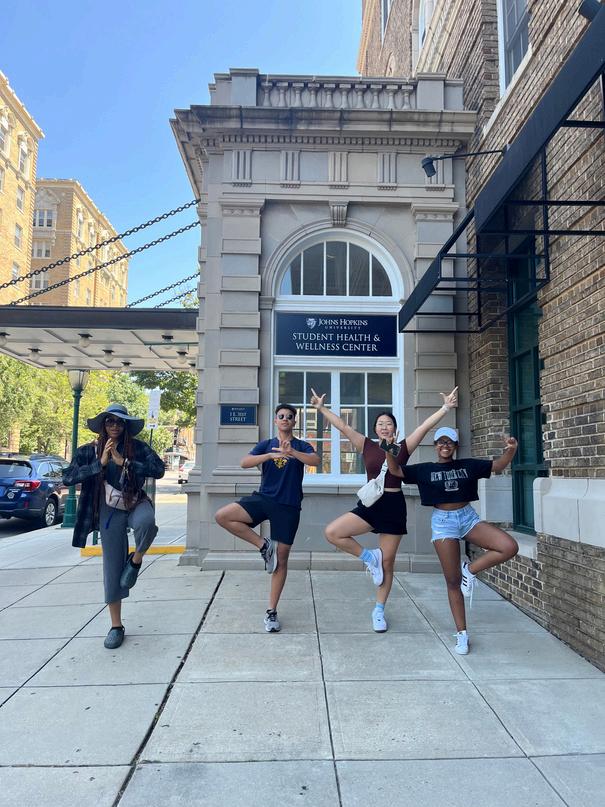
Medical & Taxes p.23

Your Resources p.31
OnbehalfoftheInternationalStudentsatHopkins (ISAH)teamandtheCenterforDiversityand Inclusion,wewelcomeallfirst-yearstudentsto TheJohnsHopkinsUniversity!
Wehopethisstudent-writtenguidebookprovidesyou somesupportasyoutransitiontoBaltimoreandJHU aseitheranincomingundergraduateorgraduate student.Thisguideiswrittenspecificallyforstudents attheHomewoodcampusbutwehopeallstudents findithelpful!
Weareexcitedforyoutojoinourorganizationand hopeyoufinda"homeawayfromhome"withinISAH!
-ISAHLeadershipTeam
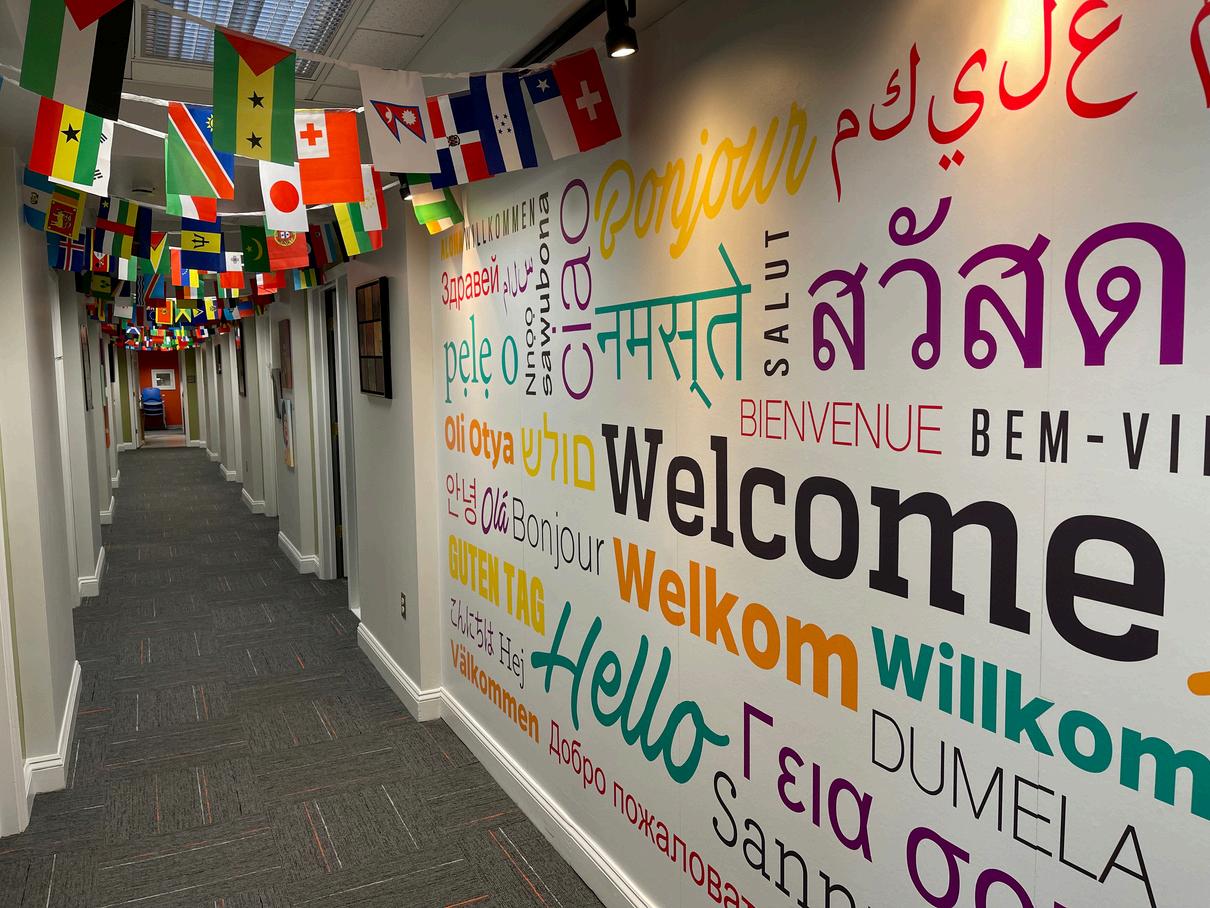
The International Students at Hopkins (ISAH) is a CDI student initiative that provides community and support for graduate and undergraduate international students at Hopkins. ISAH supports international students through three pillars: 1) communitybuilding and social connection; 2) professional development and networking; 3) cultural awareness and international student identity development.
Estelle Schurink & Izabela Jimenez Berganza
Professional Development Directors:
Anvii Mishra & Kayra Ali Ozturan
Socials Directors: Luiza Brunelli & Estele Odo Toledo de Barros
Marketing Director: Linh Pham
Any international student or student with international perspective is invited to join ISAH. We welcome all undergraduate, graduate, and post-doc to join our community.
Co-Lead Ambassador: Alice Amitrano & Daniel Olshvang
Campus Ambassadors: Milad Razavi-Mohseni
Pooja Hariharan
Rishabh Nanawati
Luke Oluoch
Pranjal Jandial
Aside from the obvious travel documents, it’s important that you bring photocopies of important documents such as your passport, travel insurance, required visa (along with I-20) and other important documents, just in case the originals get stolen.
Baltimore experiences all four seasons - be ready for hot summers and cold winters with occasional snow; pack jackets, heavy clothes, gloves and hats. Dress according to the region, weather conditions, and country’s cultural norms.
It’s always good to be prepared for any emergency. Assemble a basic first aid kit - tailored to your specific health needs - with useful medical items that will help you look after yourself. If you're taking any prescription medications, it's a good idea to get enough to ensure you're covered for as long as possibleAmerican pharmacists will not honor a foreign prescription.
It’s good practice to always keep some cash in your wallet, in case you want to eat at a local market or you’re in a situation where cards are not accepted.
Americans use different (from other countries) power plugs for which you will need to obtain a converter and/or an adapter. In order to avoid the blackout of your electronics, bring a trusty power bank (it will come in handy).
DON’T bring anything culturally inappropriate. Keep in mind that you’re representing your home country when you study abroad, so always strive to be the best version of yourself.

While international students have limitations on where and how much you can work, there are many opportunities for employment once you receive the appropriate authorization.
The Office of International Services at JHU is dedicated to providing guidance to international students on employment eligibility and authorization.
Employment options such as On-campus employment, Curricular Practical Training employment, Optional Practical Training employment, Severe Economic Hardship employment, International Organization employment, and Academic Training employment, are all examples of benefits you may be eligible for based on your academic program details and immigration status.
You will learn more about employment when you complete the OIS orientation, and if you have questions about working on or off campus at any time during your program at JHU, the OIS is happy to help: OIS offers Live webinars on employment throughout the year. These will be posted for sign-up on the OIS Announcement Page The OIS website contains detailed employment information and releases monthly newsletters with reminders about employment options
Regular phone and video advising appointments are available for students who want to speak with an advisor one-on-one
Email ois@jhu.edu with any employment questions you have


All first- and second-year students must reside in university housing or at home with a legal guardian. Students can apply for single or double rooms at various residence halls with amenities and 24/7 security guards to provide a safe and comfortable living space. For more information about on-campus housing, students can visit studentaffairs.jhu.edu/community-living/.
Students with disabilities that may need housing accommodations should make sure to contact studentdisabilityservices@jhu.edu as soon as possible since deadlines for disability related accommodations are earlier.
Students are encouraged to research and tour buildings that they are interested in with a budget in mind and to communicate with prospective roommates. To live in commercial buildings, students must contact property managers 60-120 days before the move-in date. Most students sign leases during the spring semester and move in during the summer. However, students can sign leases and move throughout the year. Students can find living residents on the off-campus database provided by Hopkins (offcampushousing.jhu.edu/). Students can visit the Off-Campus Housing Office for more assistance and resources on comparing residential neighborhoods.
Monthly newsletters are sent out by the Hopkins Homewood Student Affairs
Community Living to students about off-campus housing to help students find a comfortable and safe living situation and can be accessed at studentaffairs.jhu.edu/community-living/offcampus/resources/.
More information about commercial buildings such as comparisons on price, distance from campus and more can be found at studentaffairs.jhu.edu/communityliving/offcampus/searching/.
While living off campus, security is an important factor to consider. At Hopkins, Campus Safety and Security provides inspections for all students living in noncommercial buildings. All commercial buildings around the Homewood Campus are within the JHU security patrol zone where there are regular security patrols.
Transportation is also an important factor to consider when living off-campus. Students can take advantage of the Blue Jay Shuttle, Night Right, or Brody Shuttle to safely travel from campus to off-campus buildings at various times throughout the day and night.
International Students May be Required to Provide:
A copy of passport/visa
Proof of good credit history (property owners may banking statements from your home country)
Admission letter
A cosigner (someone who is legally required to pay rent if the student is unable to do so) or financial documentation that they are able to pay for the housing
A copy of the I-20
Do not send money to buildings without touring the propert
Do not pay rent in cash.
Know what utilities are included in the rent.
Leases are legally binding so read contracts carefully.

There are 6 official routes serviced under the daytime bus and shuttle service:
Homewood - Peabody - JHMI Shuttle: [ Map / Schedule ]
Keswick - Homewood - Eastern - JHMI Shuttle: [ Map / Schedule ]
Homewood - Bayview Express Shuttle: [ Map / Schedule ]
Homewood - Mt. Washington Express Shuttle: [ Map / Schedule ]
Remington Shuttle: [ Map / Schedule ]
MSE - Film Centre/CVA Shuttle: [ Map / Schedule ]
Ellerslie - Homewood Contractor Shuttle: [ Map / Schedule ]
Homewood - Carey Business School Express Shuttle, [ Map / Schedule ]
Hampden Circulator Schedule: [ Map / Schedule ]
Keswick-Penn Commuter Shuttle: [ Map / Schedule ]
Most Homewood and Peabody students will be familiar with the “Homewood-PeabodyJHMI Shuttle.” The “JHMI” runs Southbound from the Homewood Campus to the Johns Hopkins Medical Institutes (JHMI) and Northbound from the Johns Hopkins Medical Institutes to the Homewood Campus.
There are 13 stops on this route, and a bus is available every 5-10 minutes between 6 am and 12:30 am. You can track this schedule in real-time by downloading the TransLoc App or visiting http://ts.jhu.edu/shuttles/ to view full maps and schedules for all 6 daytime shuttle services.
Helpful Tip #1: The JHMI will not stop to pick you up or drop you off if you are not at one of the 13 designated stops. It is better to wait for the next bus than to run after one.
Helpful Tip #2: The shuttle service is free, and you never need to show any proof of ID. Ignore the urge to show the driver your J-card and avoid the awkward stares.
There are 2 main services offered by the Evening Blue Jay Shuttle: Night Ride
Night Ride is an on-demand shuttle service that is operational during the evening hours and can be requested via the TransLoc App. Pre-COVID, the shuttle ran from 5:30 pm3:45 am. Currently, the shuttle runs from 6 pm- 2 am. Through the TransLoc app, select the “OnDemand” tab, then tap on the “Homewood and Peabody Night Ride” banner to request a ride. Set your pick-up and drop-off locations and indicate how many passengers will be on the ride.
During peak hours of high demand, dispatchers will often transfer a pending ride from a Blue Jay Shuttle to Lyft. In this case, you will be notified that a Lyft driver will pick you up. You will not be required to pay; you do not need a Lyft account to coordinate this pick-up.
Helpful Tip #1: Leave enough time before your intended arrival time to request the night ride.
Helpful Tip #2: Keep an eye on the ETA (estimated arrival time)! The estimated pick-up time changes frequently, and the shuttle will leave you if you do not arrive on time at the designated pick-up stop.
The Brody Shuffle service operates from 5:40 pm and departs the Brody Learning Commons (at the entrance behind Merrick Barn) every 10-20 minutes and every 15 minutes after midnight. The beauty of this service is that you do not need to request a ride through the Transloc App. Just head to Brody, hop onto the shuttle and let the driver know where you’re headed!
Students who need assistance getting around campus due to a disability, should contact the Student Disability Services advisor at their school to learn about accessible transportation options. Additional information is available on the SDS Universitywide website under Transportation.
Ride-sharing services such as Uber and Lyft are on-demand, allowing you to schedule private car trips. Use the service to head to restaurants, clubs, interviews, etc.! Because there are no designated routes, you can pretty much take an Uber or Lyft to any location. Access the range of options and view prices through their respective apps.
Helpful Tip #1: Remember to tip your driver and rate their service!
Helpful Tip #2: Uber and Lyft have a feature allowing you to share your location with friends. This is a great safety feature, especially when travelling long distances or at night. Also, be sure to confirm that you are getting into the correct vehicle with the correctly assigned driver before you get into the vehicle.
Charm City Circulator
Free
4 Routes:
Purple: 33rd Street to Federal Hill
Green: City Hall to Fells Point to JHH
Orange: Hollins Market to Harbor Route
Banner: Inner Harbor to Fort McHenry
Track the shuttles in real time with the Charm City Circulator App
Collegetown Shuttle
Free
Only operates during the semester
Show your Hopkins ID to the driver upon entry
Services 4 Baltimore Schools:
Johns Hopkins University (Homewood Campus)
Notre Dame of Maryland University
Goucher College
Towson University
The Collegetown Shuttle also makes stops at: Penn Station
Towson Town Center
Towson Place Shopping Center
Shops at Kenilworth

View the schedule at baltimorecollegetown.org/shuttle/schedule.
Track the shuttles in real time with the TransLoc app
CityLink
Paid currently $2.00 for a single fare and $4.60 for an all day pass
Use the CharmPass App to pay for your rides
View all the bus schedules at mta.maryland.gov/schedule.
Track the shuttles in real time with the Transit app
You can access MARC (Maryland Area Regional Commuter) trains at the Baltimore Penn Station. (From Homewood or Peabody, take the Southbound JHMI). MARC trains serve as an affordable transportation service for transport to locations such as Washington D.C., BWI and other areas in Maryland.
For MARC Fares, visit this https://www.mta.maryland.gov/marc-fares.
For MARC Schedules and Routes, visit this http://mta.maryland.gov/schedule.
Amtrak is a US railroad service providing intercity routes. With a network of over 30 routes travelling to over 500 destinations, Amtrak provides transportation to Philadelphia, New York, Boston and more. Trains can be accessed at Baltimore’s Penn Station.
Search for Amtrak Routes and destinations at amtrak.com/train-routes.
Baltimore/Washington International Thurgood Marshall Airport (BWI)
From Homewood or Peabody:
Take the Southbound JHMI to Penn Station (free)
Take the Marc to train from Penn Station to BWI ($6)
OR take an Uber or Lyft for ~$60 from Charles Village.
The reverse if landing at BWI and traveling to campus (take Northbound JHMI instead)
From Homewood or Peabody:
Take the Southbound JHMI to Penn Station (free)
Take the Marc to train from Penn Station to Union Station, DC
Take the Metro from Penn Station to the Wiehle-Reston East Metro Station (on the silver line)
Take the Silver Line Express Bus Service from the metro station to the airport.
OR take an Uber (~$140 for economy vehicle) or Lyft (~$230-$280 for economy vehicle) from Charles Village.
The reverse if landing at Dulles and travelling to campus (take Northbound JHMI instead)
Students must have a social security number (SSN) to apply for a driver's license. Refer to the social security number section above for how to apply for an SSN. If you are not eligible for an SSN, you must apply for an SSN and obtain a Letter of Denial from the Social Security Administration. Students should apply for a driver’s license from the state where their school is located in.
Documents required to apply for a driver’s license:
A copy of your passport and I-20
Two documents to prove your state residency (for example, a bank statement or rent payment)
SSN or Letter of Denial from the Social Security Administration
School enrollment form
To apply for a driver’s license in Maryland, students must apply for a driver’s license in an MVA office. Before doing so, students must also submit a SAVE Electronic Verification Form (egov.maryland.gov/Mva/save) and have the required documents. Students will be contacted by the MVA within 2 business days of submitting
The SAVE Electronic Verification Form. If you are not, you should contact the MVA at sdecal@marylandmva.com.
After being contacted, students will proceed to visit a local MVA to take the written and driver’s exam if needed.
If students wear glasses, they may be asked to take a vision test if they are new drivers.
Complete a 3-hour drug & alcohol education program.
Students then register their car after obtaining a driver’s license.
Some countries have license reciprocity laws with certain U.S. states such that if you have a license from a foreign country, then you may not need to take driver's or written exams when applying for a driver’s license.
For the state of Maryland, there are license reciprocity laws with:
Korea
France Taiwan Germany Japan
India (International driving license)
If students from the above countries have an existing license, the written and driver’s exams will be waived. It must be translated if their driver’s license is not in English. Students from France and Germany must surrender their licenses from their home countries if they apply for a driver’s license in Maryland. For more information, visit the MVA website: mva.maryland.gov/drivers/Pages/international-applicants.aspx.
There are various telecommunication services that students can purchase monthly phone plans such as Verizon, T-Mobile, AT&T, Sprint and Mint Mobile and more. Payments can be made at stores or online.
Some things you may want to consider when choosing phone plans: What is the amount of internet coverage? Of call or text time?
What is the strength of cell reception?
Are there hidden fees that you have to pay?
It is helpful to compare different phone plans across different companies to find one that is cost-effective and the most suitable for you.
Things that you may need when purchasing a phone plan:
Government identification (such as a passport or a driver’s license)
Credit history
Proof of Address
Grocery/Supermarkets
Domestic
Charles Street Market (Homewood)
Giant Food (Multiple Locations)
Safeway (Multiple Locations)
Trader Joe's (Towson)
Harris Teeter (Multiple Locations)
Whole Foods (Fells Point/ Towson)
MOM’s Organic Market [Rotunda]
International
Punjab Groceries (E 33rd Street)
Lotte Plaza Market (Cantonsville)
H Mart (Ellicott City)
Patel Brothers (Cantonsville)
Move-In
IKEA (White Marsh)
Target (Boston St)
Walmart (Multiple Locations)
Costco (Glen Burnie) [you will need a membership for Costco]
Giant Food (Multiple Locations)
Books & Supplies
Barnes and Nobles (across the Homewood campus)
Amazon
Johns Hopkins Textbook Exchange (Facebook group)
Malls
The Rotunda (Hampden)
Towson Town Center (via Collegetown Shuttle)
The Shops at Kelinworth [Collegetown Shuttle]
Arundel Mills [Hanover]

Baltimore is an exciting city with a lot to offer. Here are some attractions to explore.
Visit Inner Harbor
Explore historic Fell's Point
Take a boat tour from the inner harbour or canton
Top Museums in Baltimore
Historic ships of Baltimore
National Aquarium
American visionary art museum
B&O railroad museum
Baltimore Museum of Art
Visit National & City Parks & Hiking trails (distance from Baltimore)
Lake Roland Park
Fort McHenry national monument
Visit a Maryland farm for apple and fruit picking, eating and shopping for local produce, corn maze adventures, tractor rides, and other fun activities.
Weber’s Peachberry farm
The Maryland corn maze
Clear meadow farm
Homestead farm
Nearby Cities to Visit
Washington, DC (1-hour MARC train ride, 9$ ticket each way)
Philadelphia (1.5 hours via Amtrak train or drive)
New York City (3 hours via Amtrak train)
Ocean City, MD (3 hours drive)
Delaware beaches (2.5 hours drive)
Apps to Download
Google Maps
Uber/Lyft: ride-hailing service
Venmo: mobile payment service
Amazon: e-commerce platform
Uber Eats/Grubhub/Doordash (Food Delivery)
Charm City circulator: schedule of Baltimore’s public circulator shuttle
Charmpass [to purchase train and bus tickets]
Transloc [in real time mapping for trips around the city]
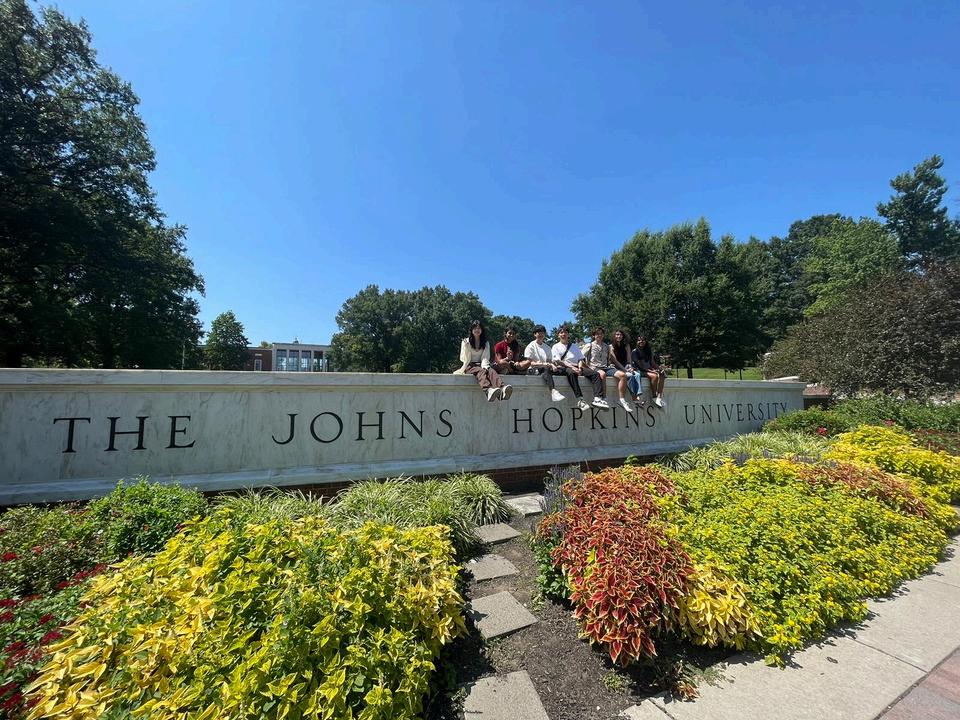
Moving to a new country is hard enough as it is and getting used to a (sometimes) completely new education system can be a little daunting. What is a TA? What is the difference between a TA and an LA? Why do they call it a “back test” instead of a “past paper”? ISAH hopes to answer all your questions about academic life at Hopkins and the broader US.
Advisor: A staff or faculty member who aids students in planning their course of study.
Academic Advisor: When you begin your undergraduate career, you will be assigned an academic advisor, a staff member who helps you to plan your college career so that you can graduate on time.
Faculty Advisor: When you declare your major(s), you will be assigned a faculty advisor (for each major or minor you declare). The faculty advisor will be someone within your major/minor of study who can provide specific advice about your program of study, such as advice about what classes to take to complete your major/minor.
Canvas: The newest learning platform, rolling out Fall 2022, used by undergraduate departments. For most of your classes, you will find course content and grades on this platform (in place of Blackboard).
Credit: A unit of measurement allocated to courses based on the effort and time they will take to complete per semester. Most courses are 3 credits, but some courses will have fewer or greater credits depending on the subject matter and time estimated t be dedicated to the course. For, example, Heat Transfer Laboratory is worth 1 credit; Studio Drawing I is worth 2 credits, Molecular Biology is worth 3 credits, and Calculus I is worth 4 credits.
Dean: The head of a university faculty or department. E.g., Dean of the Peabody Institute; Dean of KSAS; Dean of the Bloomberg School of Public Health
Elective: A course which does not directly count toward your major or minor requirements. They can still count towards your credit requirements.
LA (Learning Assistant): Undergraduate students who have previously done well in the course and were selected by instructors to guide and aid with course content during class time. You can typically find LAs in your science courses such as Cell Biology.
Lecture/ Section: A lecture is a class session hosted by the main instructor/professor for a particular class. Every student who enrolls in the course will be in a lecture (this can be as large or larger than 300 students or as small as 15 students). On the other hand, a section is a subsection of the class that consists of about 20 students and is led by a TA. Smaller classes typically will not have sections.
TA (Teaching Assistant): Undergraduate or graduate students who aid professors and students. They assist in grading and instructing, and, like professors, TAs have office hours to provide course assistance outside of class time. Your TA typically hosts “Section” meetings which are separate from but are as equally important as “Lecture” meetings hosted by a professor.
Office Hours: Allotted time outside of scheduled lecture or section times that are available to students if they have questions about course content. Both professors and TAs will have unique office hours. While attendance to office hours is optional, it provides a wonderful opportunity to seek clarity about coursework and to learn more about your professors and TAs.
Registrar: The registrar is a staff member who is responsible for keeping student records such as registration details and transcripts. The office of the registrar also handles concerns related to scheduling conflicts, adding, dropping, or withdrawing from classes and being manually enrolled into a class from the waitlist.
SIS (Student Information System): Website used to register for courses, add/drop classes, declare majors/minors, find final grades, access financial aid and billing information, and more.
Transcript: An official record of all your courses, grades, and GPAs. You can gain access to your unofficial transcript through SIS, free of charge, or order your official transcript (for a price) through SIS.
You typically choose classes during course registration periods, which are variable depending on your class level. Registration is mediated through the Student Information System (SIS), where you can find all the course offerings for a semester. Undergraduate students also fondly use the Semestr.ly platform to schedule classes, view course ratings and find out which friends are also interested in taking the course.
Hint 1: As an international student, it could be a clever idea to enroll in an “Intro to Expository Writing” class, especially if you are not comfortable with academic writing in the English language.
Hint 2: Under the “Registration” tab on SIS, you can access your Degree Audit which tracks your progress towards completing your major(s) and minor(s) of interest. The degree audit highlights what classes and how many credits you must take to be eligible for graduation, gain your major(s)/minor(s) and even to meet pre-med requirements.
Hint 3: Use the Four-Year Plan Excel Worksheet provided by the KSAS Office of Academic Advising to make a loose plan of courses you intend to take to meet major/minor and graduation requirements. Include required courses, intended electives, potential research and even Study Abroad!
It can be a little intimidating to speak to professors or TAs, but it is key to remember that they are there to support you academically. Your professors want you to excel and will encourage you to attend Office Hours.
When emailing a professor or TA, always be respectful and address them by their appropriate titles. When messaging a professor for the first time, it is always a safe bet to address them as “Professor” instead of sir, madam, Ms., Mr., or Mrs. when unsure of their preferred title.
eAccounts: mobile J-card
Corq: sign-in to campus events with the Corq QR code
Canvas: learning management system to locate class resources, submit assignments, and look up grades
Participating in class discussions can be intimidating, especially if English is not your first language or if you have an accent that others seem to have a tough time understanding. But trust that your voice and opinions matter in the classroom! Your insight and questions are just as valued in the classroom! Class participation enables you to interact and build relationships with your classmates and instructors; (for some classes, participation is even a grading criterion).
It can be difficult to transition into an entirely different education system whether it be different style of teaching, classroom atmosphere, gaps in understand, etc. There are a lot of resources to help you through this transition including professors, TAs, academic advisors and counselors. They may not be aware of your struggles, so always reach out and communicate with them get help. This transition takes time so don’t be discouraged.
Johns Hopkins expects all members of the university to bear personal responsibility and demonstrate honest, moral academic behavior. Academic misconduct includes cheating, plagiarism, forgery, falsification, facilitating academic dishonesty and unfair competition. If you are ever unsure whether an act constitutes an academic violation or find yourself in the position where you feel pressured to be dishonest, communicate with your professors or a counselor to help you through the situation. More information online.
JHU provides a host of academic support options to undergraduate students including: Learning Den Tutoring: Learning Den provides free tutoring services, including drop-in group tutoring sessions, personalized tutoring, and departmental help rooms.
PILOT: The PILOT program is a peer-led group study session where students work on problem sets for a specific course. PILOT groups meet once a week, and each is led by a trained undergraduate PILOT leader who guides you through tailored questions that reflect exam material.
Study Consulting: The Study Consulting Program pairs undergraduate students with juniors, seniors or graduate students who provide general assistance about strengthening academic skills such as time management, note-taking and more Writing Center: The Writing Center provides free academic writing support for graduate and undergraduate students to improve the quality of essays and papers. This is especially helpful if you are unsure about college-level writing in America or if English is not your first language.
Academic Accommodations: start the process by completing the Student Disability Services Online Application
One important aspect of student life at JHU is co-cirriculars -- activities outside the classroom that support and complement students’ academic, social and personal endeavors. They are important to building a well-rounded, balanced experience at Hopkins. Co-curriculars provide the opportunity to explore passions, diversify interests, meet new people, develop new skills and connect to the Hopkins community. With over 400 student organizations, Greek life, athletic programs, research and more, there is a wealth of experiences at Hopkins waiting for you.
As America’s first research university, research is a core part of the Hopkins identity. JHU offers a wide range of research opportunities across various academic fields. Research is a great way to extend your learning beyond the classroom to explore a topic that you are passionate about. With research available year-round--during the academic semesters, summer and intersession--it is never too late to start looking.
Students are highly encouraged to reach out to professors to learn more about the research they are conducting and ways to participate. ForagerOne (foragerone.com), a database listing professors/researchers with their respective projects and contact information, is a great place to start.
For undergraduates, students can refer to the Hopkins Office of Undergraduate Research (HOUR) for more information and guidance.
Students at Homewood campus can achieve personal fitness goals at the Ralph S. O’Connor Recreation Center which offers a range of facilities including group fitness classes, climbing walls, an indoor track, a pool and many more. Homewood students can also sign up for intramural team sports such as basketball, volleyball, and soccer! Non Homewood students will need to pay for membership to access these resources. More information can be found here: https://studentaffairs.jhu.edu/recreation/
Students at the DC campus located at 555 Penn have access to a small gym.
There are also plenty of co-ed teams students may join. Students living in Baltimore and DC can sign-up for Volo Sports which boasts team sports such as basketball, kickball, volleyball, pickleball, soccer, and more! Additional information can be found here: https://www.volosports.com/
Participating in service is a great way to connect to the Hopkins and Baltimore community while exploring civic engagement and leadership. At Hopkins, there are more than 40 clubs dedicated to volunteering and giving back to the Baltimore community. The Center for Social Concern hosts both long-term and short-term programs that students can join based on their availability and interests. For more information, students contact the Center for Social Concern.
Social organizations divided into fraternities for men and sororities for women, though co-ed fraternities do exist. Joined by shared values, or career interests for professional fraternities, these communities foster meaningful relationships, build supportive networks, and provide opportunity for leadership and philanthropy. It is often a foreign or stereotyped concept for international students, but don’t be intimidated. If Greek life is something you are interested in joining, learn more through the Office of Fraternity and Sorority Life.
There are more than 400 student-run organizations at Hopkins that cater towards different passions and interests, including culture, academics, performance arts, spirituality, student publications, advocacy and more. Joining a student-run organization is a great way to find a community of like-minded people who share your passions and explore new interests and connect with people who are different from you.
Hopkins Group (jhu.campusgroups.com) is an online portal that lists all student organizations with their contact information, upcoming events, and mission statements. Browse to find an organization that matches your interests, and reach out to learn how you can get involved.
One of the largest and most anticipated events hosted every semester, the Student Involvement Fair (SIF) is an event where student organizations showcase what they are doing and how you can get involved. You get the opportunity to learn about different organizations, talk to current members, and even watch a demonstration or two. As the most comprehensive showcase of student organizations, this is a great event to kick-start your co-curricular involvement at JHU. Visit your campus to find the dates for your SIF.
Black and African
African Students Association
Eritrean & Ethiopian Student Association
Caribbean Cultural Society
Black Student Union
Latine
Cuban American Undergraduate Students Association
Puerto Rico Student Association
OLE
Brazilian Students Association
Hopkins LEM
Mexican American Student Association
APIDA (Asian, Pacific Islander, Desi American)
Johns Hopkins Korean Student Association
Filipino Students Association
Singapore Student Association
Korean American Student Association
Japanese American Student Association
Taiwanese American Student Association
Inter-Asian Council
Bangladeshi American Student Association
South Asian Students at Hopkins
Chinese Student Association
Vietnamese Students Association
Hong Kong Student Association
MENA (Middle Eastern, North Africa)
Arab Student Union
Turkish Student Association
Iranian Cultural Society
Graduate Cultural Organizations
Black Graduate Student Union
Chinese Cuisine Club
Chinese Students and Scholars Association at the Johns Hopkins University
Korean Graduate Student Association
Society of Asian Scientists and Engineers (SOASE)
DISCLAIMER: This section does not contain any legal or coverage advice and is for informational purposes only. The information may be wrong, incomplete, and/or outdated, and it may or may not apply to you. You should consult with University Health Services with all questions.
JHU requires all students/learners to have health insurance coverage. All International students with an active F1 or J1 Visa status, are ineligible to waive and are required to purchase the university plan.
The cost for medical insurance will be added to the students SIS (tuition) bill. There are some instances where a student’s department covers the cost of health benefits. In these situations, students will see a credit on their SIS bill for medical, dental and/or vision coverage.
PhD students are auto-enrolled in medical, dental and vision coverage as their individual premiums are paid by their department.
Medical students are auto-enrolled in medical and dental.
All other full time students are auto-enrolled in medical coverage, but have the option to enroll in dental and vision.
Visiting students/learners will be required to self-enroll into coverage based on the dates provided on their appointment letter, please visit jhu.myahpcare.com to upload a copy of your appointment letter and enroll into coverage.
The medical plan provides comprehensive coverage for medical and prescription needs. The plan utilizes the Cinga PPO Network so for the lowest cost of care, you should go to an in-network provider. In-network providers can be found on the Cigna website: Cigna Health Care Provider Directory.
JHU also offers students the option to enroll into dental and vision coverage for an additional fee. Dental insurance provides coverage for services such as biannual cleanings and cavity fillings. Vision insurance provides coverage for services such as an annual eye exam, and discounts on contacts and glasses. To enroll into dental and vision coverage, login to the Academic HealthPlans website between July 1 – September 15, select the coverage you want and submit your payment.
All currently enrolled students are eligible for medical care at Student Health & Well-Being (SHWB) Primary Care clinics. SHWB Primary Care offers a broad range of medical services, including preventive care as well as the evaluation and treatment of most acute and/or chronic medical conditions affecting adolescents and adults.
There is no charge for clinic visits; however, additional services such as labs, xrays, and medications will be billed to your health insurance.
For complicated medical conditions requiring specialized services, our primary care providers can refer you to appropriate specialists.
There are primary care clinics at the Homewood, DC and East Baltimore Campuses. To determine the best campus for your appointment, visit the eligibility page on the primary care website (https://wellbeing.jhu.edu/ PrimaryCare/eligibility/).
Students may see providers outside of SHWB Primary Care, including through Johns Hopkins Medicine. Those providers may use other electronic health portals.
For more information about the benefits offered to students please visit Student & Learner Health Benefits - JHU Human Resources or email JHUStudentBenefits@jhu.edu
MyHealth Portal (https://myhealth.wellbeing.jhu.edu/) to upload their preentrance health forms, communicate with their on-campus healthcare providers, and more.
myChart is a tool that stores all your health information such as test results, providers, vaccinations and so on. Also, it allows you to find doctors and providers in your area for most of your health related needs.
Download myChart jhu from the app store or browse: https://mychart.hopkinsmedicine.org/MyChart
You can schedule an appointment with a general or specialized doctor in Baltimore by tapping on “visits”
Please confirm that the provider you chose is covered by your insurance by calling or emailing.
All the messages from the providers, prescriptions, test results, or medications are available as well
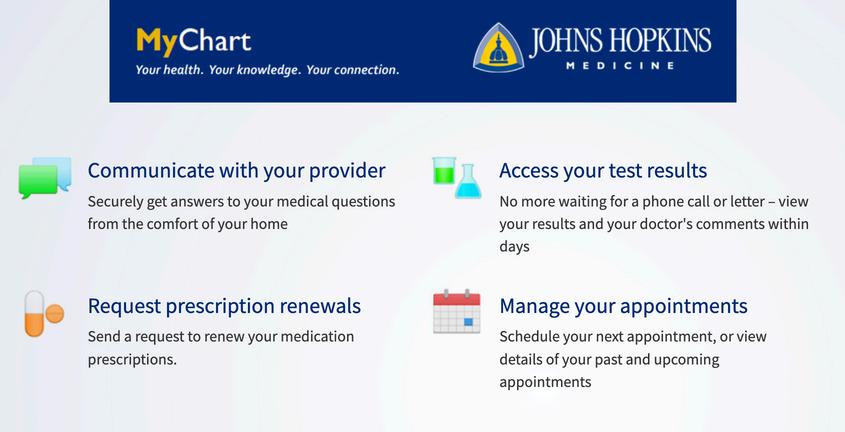
DISCLAIMER: This section does not contain any legal or tax advice and is for informational purposes only. The information may be wrong, incomplete, and/or outdated, and it may or may not apply to you. You should consult a certified tax professional regarding any particular issue or problem.
Individuals who earn income during a particular year may have to file (submit) a tax return (tax forms) with the US Internal Revenue Service (IRS) and their state. Additionally, some international students who do not earn income may still need to submit particular forms to the IRS. Generally, if an individual earns an income from JHU, the tax office withholds (keeps) a certain amount of the paycheck and sends it to the IRS and/or the state. When you file your taxes at the end of the tax year, you calculate whether the total withholding amount was higher or lower than the actual tax you must pay and ask the IRS (or state) to issue you a refund (giving back) if your withholding was greater than taxes you owe, or you pay to the IRS (or state) if you owe more taxes than your withholding.
The JHU FNIF (Foreign National Information Form) is an online form that requests a summary of your visa history in the US as well as your current purpose for being in the US.
This information is used to ensure that your payroll record is accurate for tax withholding purposes. Once the tax office approves your FNIF, you will be able to set up direct deposit using Employee Self Service (ESS).
This form can be found on the JHU Tax Office web page. If you do not have a US issued social security number, a temporary ID will be assigned to you by the registrar’s office to be used until you receive your official SSN. This nine digit number beginning with 988 is not to be used for any purpose outside of JHU.
Wage (Form 8843 and year-end tax document W2):
Annual payment divided by 24 semi-monthly payments of the same amount An hourly pay rate that is multiplied by the number of hours worked per week. JHU pays on a semi monthly basis.
Fellowship (Form W8-BEN and year-end tax document 1042-S):
Payment that is not based on services performed and is to supplement to any scholarships received.
All payments are subject to federal and state tax withholding as required by law unless covered by a tax treaty.
Wage payments are subject to a graduated tax calculation. In other words, the tax rate will increase as your taxable income increases per pay.
Fellowship payments are subject to a flat 14% federal nonresident tax plus any state income tax determined by each individual state.
As part of your hiring process, you will want to submit a Form W4 (Federal) and MW507 (MD) to the tax office. Instructions for filling out the Form W4 and Exempt MW507 can be found in the JHU Tax Office web page.
If you are a nonresident alien, you will want to submit the Form W4 as soon as you are in payroll. This is to ensure that your federal income tax withholding is based on your nonresident status.
JHU pays employees on a semi-monthly schedule. You will receive your pay on the 15th and the last day of the month.
We encourage that you regularly check your remuneration statement (paystub). If you have any questions related to your pay, you should follow these instructions:
Examine your pay details online through ESS so you can see exactly what you were paid and what taxes were withheld.
Contact your department if you believe the amount of pay you received is incorrect, or if you did not receive your expected pay.
Contact Payroll Shared Services if you did not receive the pay that you see through ESS.
Use the NRA Intake Form to report any tax related issues.
There are treaties between the US and certain foreign countries that will allow applicable individuals to exempt a portion or all of their income from federal withholdings.
Maryland does not adhere to federal treaties.
JHU will facilitate these treaties as long as you have a Social Security Number.
JHU will NOT facilitate treaty benefits to individuals whose nationalities do not match their country of residence.
Example: You are a Chinese national that is now a resident of Canada after living there for 6 years. We would not facilitate treaty benefits as you may be applicable for benefits from either Canada or China.
Note that JHU choosing not to facilitate your treaty benefits does not necessarily mean that you are ineligible for treaty benefits. We recommend speaking to your tax professional if you feel that you can claim a wage treaty benefit. You can reach the JHU Tax Office via our NRA Intake Form regarding facilitating your treaty benefits.
Each year in the spring, both Maryland (or your state of residence) and the federal government requires every employee to submit a report of their payroll earnings and taxes withheld.
Known as a ‘tax return.’ This does not mean that you will automatically have your taxes returned to you – this is simply the terminology used. You should receive a year-end tax form (W2 or 1042-S) that provides your earnings and taxes withheld for the calendar year.
In previous years, JHU provided its international students with access to an online tax preparation program that assists in preparing the federal tax return free of charge (Sprintax for tax year 2023). This program also provides state income tax preparation for a fee.
As a reminder, the JHU Tax Office can only provide general information related to the tax return. We can not prepare your returns or give specific tax advice.
IMPORTANT NOTE: International students who are “non-resident aliens (NRA) for tax purposes” must file a tax return form that can be different from what US citizens and residents normally use. Many common tax preparation software programs are unsuitable for filing NRA tax forms for international students and may incorrectly calculate your taxes. So, if you are using a tax preparation program and if you are a non-resident alien (NRA for tax purposes), you should use a tax software program that takes your NRA status into account.
NRA Intake, Withholding Forms: Visit the JHU Tax Office for all of your questions
FNIF: Visit the JHU Tax Office for all of your questions
Employee Self Service (ESS): Visit the JHU Tax Office for all of your questions
Contacts
FNIF email address for general inquiries: fnif@jhu.edu
Payroll Shared Services email address for general inquiries: payroll@jhu.edu
OIS is dedicated to helping international students navigate immigration and legal matters. They are the office to contact if you need assistance regarding your I-20, visa, employment status, social security, and more. Contact them at ois@jhu.edu or 667-208-7001.
CDI is committed to making Johns Hopkins University “a home away from home.” Besides helping to enhance the study experience of underrepresented groups at Hopkins, CDI also provides students with the opportunities to engage in multicultural celebrations and educational Programs.
CDI has three departments including Multicultural Affairs, Gender & Sexuality Resources, and Religious & Spiritual Life.
Multicultural Affairs is dedicated to creating an inclusive campus through student engagement, diversity education, advocacy, and leadership development.
Gender & Sexuality Resources works to create a more equitable and supportive Hopkins community for folks with marginalized sexual, gender, and romantic identities.
Religious & Spiritual Life supports spiritual development, theological reflections, religious tolerance and social awareness among the Hopkins community.
CDI houses several student initiatives including the International Students at Hopkins (ISAH) & Disabled Student Community Outreach (DiSCO).
DiSCO aims to create a unified sense of community for all students with a disability by advocating for the disabled student experience, cultivated dialogue, and increasing visibility of students with disabilities.
JHU counseling center provides safe and confidential services to protect students' health. Students can sign up to chat with a counsellor from the MHS webpage. However, if students require emergency intervention, please dial 410-516-8278 and press “1” at any time, 24/7, to reach an on-call counsellor immediately. Visit the services link to learn more about the various types of appointments, workshops and groups that MHS offers.
Primary Care consists of three clinic locations (Homewood, East Baltimore, and Washington DC) that provide a variety of medical services for the evaluation and treatment of an illness or injury, preventive health care and health education to the Johns Hopkins University student and trainee population. Visit the website for information on vaccines, health forms, and to access the health portal.
Life Design Lab, also known as the career center, helps students pursue lifelong personal and professional career developments, gives students comprehensive advice, and provides students access to opportunities.
The JHU Financial Aid office dedicates to making world-class education accessible by providing need-based scholarships to the brightest minds. Financial aid advisers will be available the entire time to guide every student and student’s family through different financial programs and help them find the right fit.
SDS works university wide with students at all Hopkins schools, guiding accessibility and inclusion for students with disabilities, coordinating accommodations, and providing resources. These Frequently Asked Questions provide information about how disability is defined, eligibility for services, and how confidentiality is maintained as well as some common accommodations. Students can get started by completing the Student Disability Services Online Application.





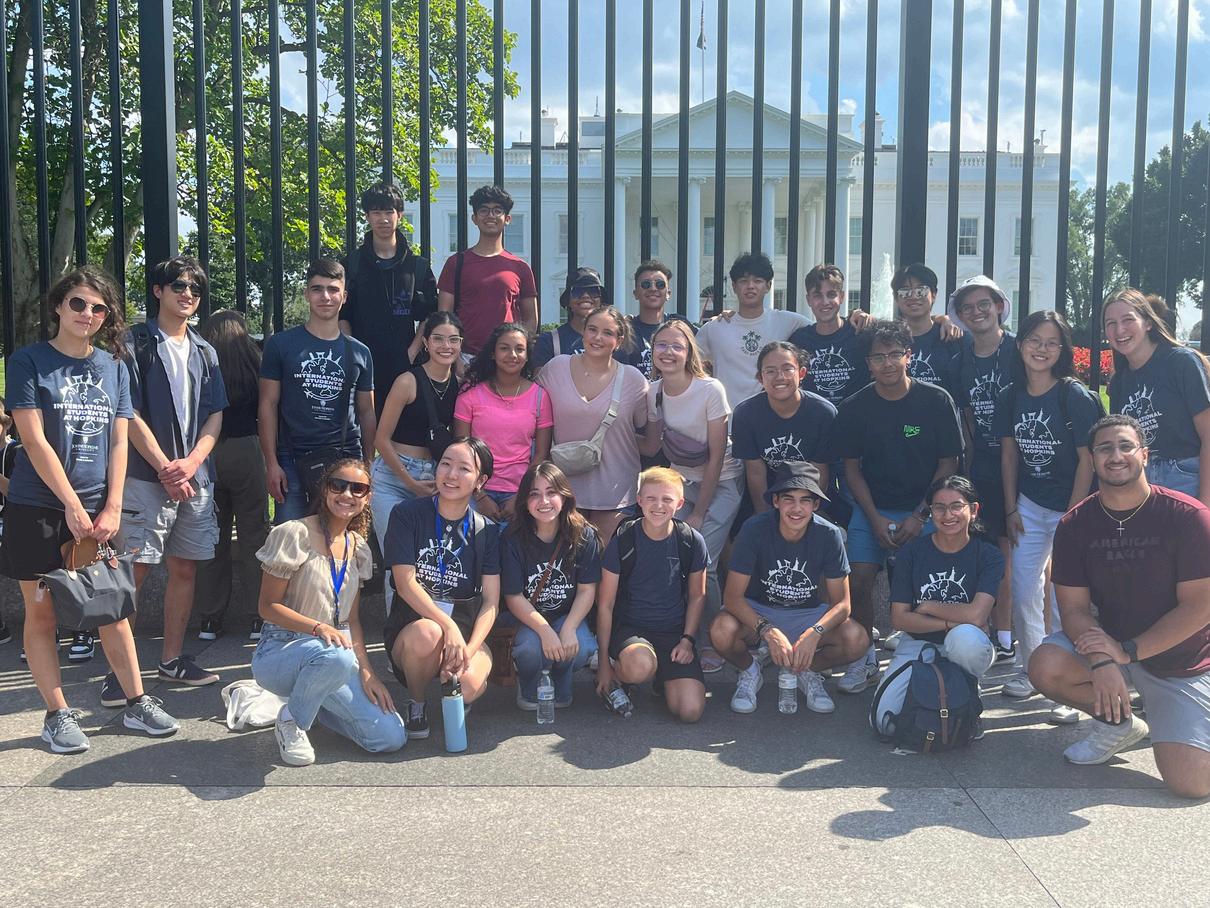
In the U.S., the prices on the price tag are usually not the final price that you have to pay at the cashier. The original price times the sale tax would be the final price you have to pay for most commercial goods, and this tax varies from state to state. In Maryland, the sales tax is 6%.
In the US, you are expected to tip for various services. Restaurants, taxis and ordering food are all services you are expected to tip. Tip amount is not set and is based on the customer’s satisfaction with the service. If you are very impressed with your service, you might decide to tip 20%. You may only offer 10%-15% tips if you think the service is not ideal but still acceptable. However, if you are not satisfied with the service you’ve received, you are still encouraged to offer at least some tips.
Unlike most other countries, the U.S. prohibits alcohol consumption for anyone under the age of 21.
The state of Maryland legalized cannabis (marijuana) as of July 2023. To review the JHU policy visit https://wellbeing.jhu.edu/blog/2023/06/28/things-hopkins-students-need-toknow-about-cannabis-legalization-in-maryland/
While some countries have different numbers to contact police, hospital or fire departments, 911 is the number to dial in the U.S. when you have encountered crime, emergency medical services, or fire.
The U.S. uses the imperial system of measurement in classrooms and everyday life.
1 inch (in.) = 2.54 cm
1 ounce (oz.) = 28.35 g
1 mile (mi.) = 1.6 km
1 pound (lb.) = 453.5 g
1 feet = 30.48cm
32 Fahrenheit = 0 Celsius
Independence Day - July 4th: celebrates the Declaration of Independence of the U.S. Thanksgiving - fourth Thursday of November: day of giving thanks for the blessing in the preceding year. Students usually get a one-week break.
Martin Luther King Jr. Day – January 17th: celebrates the birthday of civil rights activist Martin Luther King Jr.
Labor Day – September 6th: honors and recognizes the American labor movement Memorial Day – May 31st: honors and mourns military personnel who have died while serving the US Armed Forces.
As you adapt to life in the US, differences between your native and US cultures may become increasingly apparent. These differences may begin to seem more irritating than interesting and may cause anxiety and concern that impact your academic and social life. Experiencing culture shock can be scary, but it begins to ease as you start to understand the new culture.
As you adjust, remember to take good care of yourself; call family and friends from home, connect with others from the same background or cook yourself food from home. There are a wealth of resources at Hopkins that can help you through this transition, including the counseling center, cultural student groups and ISAH ambassadors.
Physical Health & Sexual Wellness:
Student Health & Wellness Center
Student Disability Services
Gender & Sexuality Resources
Sexual Assault Helpline (confidential)
Student Outreach & Support
Student Outreach & Support
Student Financial Services
University Experiential Learning
Homewood Student Accounts
Emotional & Spiritual Wellness: Professional Wellness:
Center for Student Success
Center for Diversity & Inclusion
Academic Advising
Office of International Services
Student Employment Services
Life Design Lab
Leadership, Enagement, & Experiential Development
Behavioral Health Crisis Support Team: 410-516-9355 or Text HOME to 741741 or visit https://www.crisistextline.org
Religious & Spiritual Life
Center for Diversity & Inclusion
Student Disability Services
Mental Health Services
A Place to Talk (APTT)
Calm App SilverCloud
Academic Advising Faculty Advisor
PILOT (undergraduates)
Study Consulting
Learning Den
Math Help Rooms
Student Outreach & Support Writing Center
